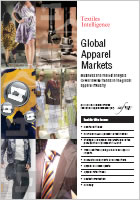Issue
30:
2nd Quarter 2015

Product Overview
Buy this Issue now
Subscribe
Download brochure (PDF)
Download price list (PDF)
Price list download
| Please choose your preferred currency:
|
Request sample issue
View list of reports
in other issues
|
Multi Report Package |
We also offer a flexible subscription product,
the Multi Report Package,
which allows you to select your own choice of reports from our full range,
to suit your own budget.
Click here for full details.
|
|
 |
Talking strategy: Sean Cady of VF Corporation discusses responsible sourcing and the importance of collaboration |
|
published in Issue 30, 2nd Quarter 2015
|
Apparel brands and retailers are under growing pressure from regulatory authorities and non-governmental organisations (NGOs) to become more socially responsible and to make their supply chains safer and more environmentally sustainable. As a result, the majority of companies have put in place, or are in the process of putting in place, responsible sourcing strategies in order to improve their corporate social responsibility (CSR) credentials and increase their efficiencies. In the case of VF Corporation, such strategies have included reducing energy consumption, reducing waste, reducing transit miles and implementing responsible sourcing in terms of environmental sustainability – including work with the Better Cotton Initiative (BCI) and Solidaridad – as well as product stewardship, raw material traceability and worker wellbeing. In this report, Sean Cady – the vice-president of Global Responsible Sourcing at VF Corporation – discusses the importance of responsible sourcing and the challenges it presents. Also, he discusses the role of industrial collaboration in the promotion and development of responsible sourcing practices.
|
 |
